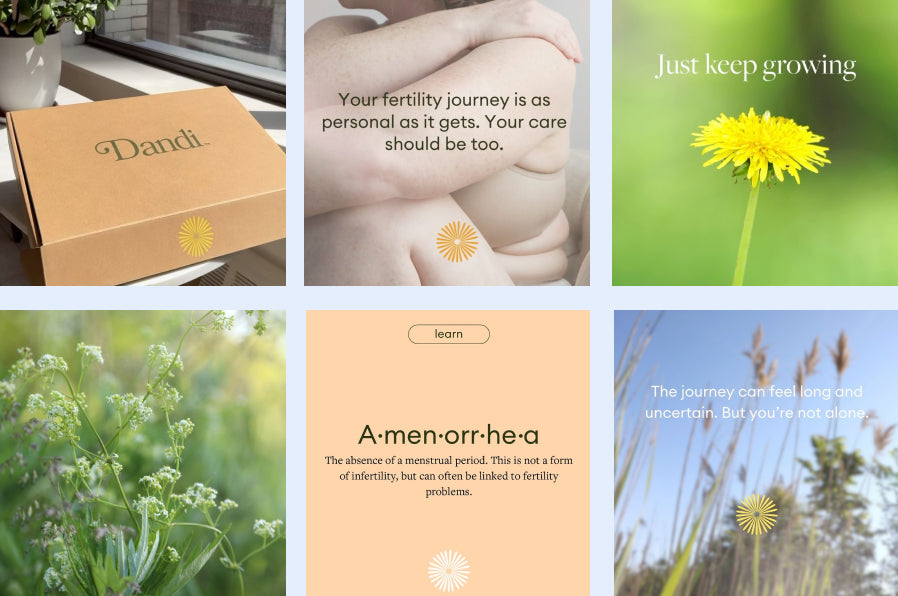Building your family is about so much more than the actual getting pregnant part. Lifestyle factors can play a huge part in maximizing fertility, whether you ultimately conceive spontaneously or with the help of assisted reproductive technologies (ART) like IUI or IVF.
In this installment of DandiTV, Sasha Hakman, MD, reproductive endocrinologist at HRC Fertility in Beverly Hills, CA, explains lifestyle factors that can improve fertility, as well as what can be harmful when TTC. From exercise during IVF to what to eat (and what not to wear?), Dr. Hakman breaks it all down and shares her actionable tips and small changes you can start implementing ASAP to maximize success.
Plus, what’s the medical recommendation for caffeine consumption during a treatment cycle? All that and more below:
Exercise and fertility
Working out can improve fertility if you have ovulatory dysfunction, which means your ovaries don’t release an egg regularly or at all (anovulation).
Resistance training builds muscle, which helps reduce the elevated testosterone levels we may see in some women with ovulatory dysfunction, particularly those with polycystic ovarian syndrome (PCOS), and helps improve insulin sensitivity. Exercise can also help to improve your metabolic rate, which is how your body expends energy, and your hormone function, which can make your menstrual cycle more regular and therefore your ovulation more predictable.
Best exercises when TTC
The recommendation for exercising when trying to get pregnant is 150 minutes per week of exercise, which ideally will be broken down as follows:
-
2-3 sessions per week of resistance and strength training
-
1 session per week of cardio, ideally with high-intensity interval training (HIIT) to elevate your heart rate
It’s okay to do vigorous exercise every day when you’re trying to conceive, but try to limit your workout to one hour per day.
Exercise during IVF
The rules for exercising during IVF can be hard to determine, since there’s no evidence-based guidance from the American Society of Reproductive Medicine (ASRM). If your doctor told you to take a break from working out during a stimulation cycle, it’s probably because hypothetically, exercising during a stim cycle could increase the risk of ovarian torsion, when the ovary twists upon itself. But there’s no evidence to support this.
Ultimately, you need to listen to your body. If you feel up to it, continue your workout routine, especially if working out makes you feel better physically and emotionally while you’re undergoing IVF.
HIIT training during IVF
If you have low egg reserve (low AMH) and only a handful of follicles have responded to the IVF medications during your stim cycle, it’s okay to continue your HIIT workouts.
If you have a higher ovarian reserve, this means your ovaries are larger, so jumping around during a HIIT workout might be uncomfortable. Again, it’s all about listening to your body. If you don’t feel your ovaries moving around in your pelvis when doing HIIT training, then it’s probably okay to continue, but ask your doctor (or your Dandi nurse) if you’re not sure.
Nutrition and fertility
The closest thing to a fertility diet is a Mediterranean-style diet, not just for getting pregnant but for longevity and overall health. The Mediterranean diet focuses on whole foods, high-fiber carbs like legumes, healthy fats like avocado, seeds and olive oil as well as plant-based protein and fish. The idea isn’t to necessarily eliminate red meat and poultry, but to eat less of it.
Processed foods and fertility
The biggest concern with processed foods is they often contain what we call endocrine-disrupting chemicals, which can change hormone function, including the reproductive hormones, and increase the risks of chronic disease and cancer. We can’t avoid these completely; they’re everywhere in our environment. The goal is not to create paranoia, but to reduce exposure to these toxins when trying to conceive in the foods we eat and overall. (More on endocrine-disrupting chemicals below).
There’s a lot of myth surrounding gluten and dairy, particularly that they can worsen inflammation which can affect your ability to get pregnant. But rather than eliminate all gluten or dairy from your diet, try to focus on high-fiber carbs with a low glycemic index, which means the food is digested and absorbed more slowly to keep you fuller for longer.
Nutrients that help fertility
There are a few vitamins that are beneficial for reproductive health, including antioxidants, folate and Omega-3 fatty acids.
In fact, Omega-3s can improve egg quality and are beneficial for baby’s brain development during pregnancy. You can get Omega-3s from dietary sources such as fatty fish like salmon, nuts and seeds, or via supplementation in a prenatal vitamin.

Caffeine and fertility
This is a controversial topic. The ASRM’s general guidelines for caffeine consumption when trying to conceive is to stick to 200 milligrams a day, which is 1-2 small cups of coffee. This rule for moderate caffeine consumption applies for fertility treatments, transfer cycles and pregnancy.
Endocrine-disrupting chemicals and fertility
Endocrine-disruptors can’t be avoided completely, but the easiest and most obvious places to avoid endocrine disruptors is by limiting our exposure to:
-
Microplastics, by drinking water out of glass or stainless steel bottles instead of plastic. Microplastics leech into water even more if the bottle has been exposed to the sun.
-
Pesticides, by buying organic produce from a local farm and/or washing all fruit and vegetables thoroughly before consuming
-
Volatile organic compounds (VOCS) by avoiding perfumes, laundry detergent and other household fragrances. Studies have found that VOCs can halt embryo development because they break down the DNA strand in the embryo. Stick to non-toxic products when you can.
-
Heavy metals, by implementing air filters at home to limit air pollution
We know from a medical standpoint that if you have PCOS or endometriosis, being exposed to these chemicals can worsen the disease or cause its onset. By eliminating some of these toxins, we can assume that egg quality (and sperm quality) will improve, therefore leading to more successful IVF outcomes.
Sleep hygiene and fertility
Women need more sleep than men; a minimum of 8 hours of high-quality sleep a night is ideal. That’s because while you’re sleeping, your brain is working hard to secrete reproductive hormones like FSH and LH to synchronize your cycle and help you ovulate regularly.
Some people are more sensitive to sleep disruption than others, but for all of us, disrupted sleep can interfere with these normal secretions of hormones from the brain, which communicate with the ovaries and the uterus. We know this from studies that have found that night shift workers have poorer reproductive outcomes because they’re up all night and their sleep is irregular.
Lifestyle tips while TTC
If you’re just starting out on your fertility journey, you may feel overwhelmed by all the lifestyle changes you think you need to be making. But really, it all boils down to three key tips:
Do your research. This means learning all you can about nutrition and your own caloric needs, as well as techniques for weight lifting and resistance training. If it becomes overwhelming, work with a dietitian and/or a personal trainer who can help guide you.
Begin resistance training. Easier said than done, but try not to be intimidated by resistance training. People underestimate how important it is not just for fertility, but for the rest of your life and your overall health. Take one step at a time, learn the techniques and stay consistent.
Stay consistent. If you want to improve your lifestyle, incorporating too many things all at once can be daunting and lead to failure. Change one bad habit at a time and stick with it. And don’t expect yourself to be 100 percent perfect every day.
If you want to learn more about lifestyle factors and fertility, check out more resources on my website, Sashahakmanmd.com. You can also book a 1:1 fertility planning consultation with a registered nurse through Dandi; your nurse can answer all your questions and address any concerns as you begin to think about your next steps in building your family.








